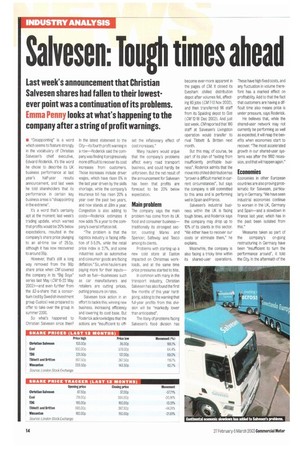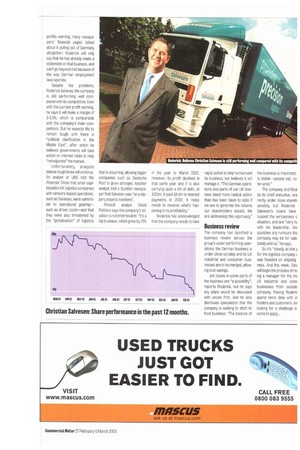Salvesen: Tou Ii es ahead
Page 14

Page 15

If you've noticed an error in this article please click here to report it so we can fix it.
Last week's announcement that Christian Salvesen shares had fallen to their lowestever point was a continuation of its problems. Emma Penny looks at what's happening to the company after a string of profit warnings.
• 'Disappointing is a word which seems to feature strongly in the vocabulary of Christian Salvesen's chief executive, Edward Roderick. it's the word he chose to describe its UK business performance at last year's half-year results announcement, and last week he told shareholders that its performance in certain key business areas is "disappointing in the extreme".
It's a word that's certainly apt at the moment last week's trading update, which warned that profits would be 20% below expectations, resulted in the company's share price plunging to an all-time low of 29.5p, although it has now recovered to around 36p.
However, that's still a long way removed from the 98p share price when CM covered the company in its "Big Boys" series last May ( CM 16-22 May 2002)—and even further from the 12-a-share that a consortium (led by Swedish investment group Custos) was prepared to offer to take over the group in summer 2000.
So what's happened to Christian Salvesen since then? In the latest statement to the City—its fourth profit warning in a row—Roderick said the company was finding it progressively more difficult to recover its cost increases from customers. Those increases include driver wages, which have risen 6% in the last year driven by the skills shortage, while the company's insurance bill has risen 20% a year over the past two years, and now stands at am a year Congestion is also adding to costs—Roderick estimates it now adds 1% a year to the company's overall inflation bill.
"The problem is that the Logistics industry is facing inflation of 5-5.5%, while the retail price index is 2.7%, and some industries such as automotive and consumer goods are facing deflation." Sc, while hauliers are paying more for their inputs— such as fuel—businesses such as car manufacturers and retailers are cutting prices, putting pressure on rates.
Salvesen took action in an effort to tackle this; winning new business, increasing efficiency and lowering its cost base. But Roderick acknowledges that the actions are "insufficient to off
set the inflatonary effect of cost increases."
Many hauliers would argue that the company's problems affect every road transport business, and could hardly be unforseen. But the net result of the announcement for Salvesen has been that profits are forecast to be 20% below expectation.
Main problem
The company says the main problem has come from its UK food and consumer business— traditionally its strongest sector, counting Marks and Spencer, Safeway and Tesco among its clients.
Problems with starting up a new cold store at Easton impacted on Christmas workloads, and at the same time price pressures started to bite.
In common with many in the transport industry, Christian Salvesen has also found the first few months of this year hardgong, adding to the warning that full-year profits from this division will be "markedly lower than anticipated".
The litany of problems facing Salvesen's food division has become ever-more apparent in the pages of CM. It closed its Evesham chilled distribution depot after volumes fell, affecting 80 jobs (CM 7-13 Nov 2002), and then transferred 96 staff from its Spalding depot to Gist ( CM 12-18 Dec 2002). And just last week, CM reported that 180 staff at Salvesen's Livingston operation would transfer to rival Tibbett & Britten next month.
But this may of course, be part of its plan of '`exiting from insufficiently profitable business". Roderick admits that the move into chilled distribution has "proven a difficult market in current circumstances", but says the company is still committed to this area and is performing well in Spain and France.
Salvesen's industrial business within the UK is facing tough times, and Roderick says the company may drop up to 10% of its clients in this sector. "We either have to recover our costs or eliminate them," he explains.
Meanwhile, the company is also facing a tricky time within its shared-user operations. These have high fixed costs, and any fluctuation in volume therefore has a marked effect on profitability Add to that the fact that customers are having a difficult time also means price is under pressure, says Roderick.
He believes that, while the shared-user network may not currently be performing as well as expected, it will reap the benefits when economies start to recover. "The most accelerated growth in our shared-user systems was after the 1992 recession, and that will happen again."
Economies
Economies in other European countries are also proving problematic for Salvesen, particularly in Germany. 'We have seen industrial economies continue to worsen in the UK, Germany and Spain—and a slowdown in France last year, which has in the past been isolated from this."
Measures taken as part of the company's on-going restructuring in Germany have been "insufficient to turn the performance around", it told the City. In the aftermath of the profits warning, many newspapers financial pages talked about it pulling out of Germany altogether; Roderick will only say that he has already made a statement on that business, and can't go beyond that because of the way German employment laws operate.
Despite the problems, Roderick believes the company is still performing well compared with its competition. Even with the current profit warning, he says it will make a margin of 3-3.5%. which is comparable with the company's main competitors. But he expects life to remain tough until there is "political clarification in the Middle East", after which he believes governments will take action on interest rates to help "reinvigorate" the market.
Unfortunately, analysts believe tough times will continue. An analyst at UBS told the Financial Times that small capitalisation UK logistics companies with network-based operations, such as Salvesen, were vulnerable to operational gearing— such as driver costs—and that they were also threatened by the "globalisation" of logistics
that is occurring, allowing bigger companies such as Deutsche Post to grow stronger. Another analyst told a Scottish newspaper that Salvesen was "on a slippery slope to nowhere".
Plimsoll analyst David Pattison says the company's situation is not irretrievable. It's a big business, which grew by 13%
in the year to March 2002. However, its profit declined in that same year and it is also carrying quite a bit of debt, at 2132m: it paid 113.4m in interest payments in 2002. It really needs to reverse what's happening to its profitability."
Roderick has acknowledged that the company needs to take rapid action to help turnaround its business, but believes it will manage it. "The German operations and parts of our UK business need more radical action than has been taken to date if we are to generate the returns our shareholders expect. We are addressing this vigorously."
Business review
The company has launched a business review across the group's under-performing operations; the German business is under close scrutiny and its UK industrial and consumer businesses are to be merged, allowing cost-savings.
Job losses in some parts of the business are "a possibility", reports Roderick. but he says any plans would be discussed with unions first. And he also dismisses speculation that the company is seeking to ditch its food business: "The balance of the business is important. is stable—people eat, no ter what," The company and Rod( as its chief executive, are rently under close shareh scrutiny, but Roderick Salvesen's board have cussed the seriousness c situation, and are "very ho with his leadership. Ant scotches any rumours the company may be for sale totally untrue," he says.
So it's "steady as she k for the logistics company si was founded on shipping ness. And this week, Salv will begin the process of rel ing a manager for the ma UK industrial and cons' businesses from outside company, freeing Roderic spend more time with sl holders and customers. An looking for a challenge is come to apply...


































































































































































